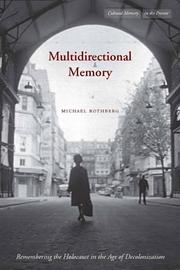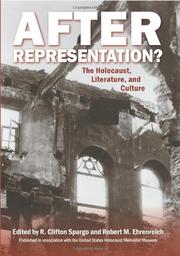| Listing 1 - 6 of 6 |
Sort by
|

ISBN: 9780804762175 9780804762182 080476218X 0804762171 0804783330 9780804783330 Year: 2009 Publisher: Stanford, Calif. Stanford University Press
Abstract | Keywords | Export | Availability | Bookmark
 Loading...
Loading...Choose an application
- Reference Manager
- EndNote
- RefWorks (Direct export to RefWorks)
Multidirectional Memory brings together Holocaust studies and postcolonial studies for the first time to put forward a new theory of cultural memory and uncover an unacknowledged tradition of exchange between the legacies of genocide and colonialism.
Comparative literature --- Thematology --- Jewish religion --- anno 1940-1949 --- Holocaust, Jewish (1939-1945) --- Holocaust, Jewish (1939-1945), in literature --- Decolonization in literature --- Decolonization --- Collective memory --- Collective memory in literature --- Historiography --- Collective memory in literature. --- Collective memory. --- Decolonization in literature. --- Holocaust, Jewish (1939-1945), in literature. --- Historiography. --- Holocauste, 1939-1945 --- Holocauste, 1939-1945 dans la littérature --- Décolonisation --- Décolonisation dans la littérature --- Mémoire collective --- Mémoire collective dans la littérature --- Historiographie --- Decolonization - Historiography. --- Decolonization -- Historiography. --- Holocaust, Jewish (1939-1945) - Historiography. --- Holocaust, Jewish (1939-1945) -- Historiography. --- History & Archaeology --- History - General --- Holocauste, 1939-1945 dans la littérature --- Décolonisation --- Décolonisation dans la littérature --- Mémoire collective --- Mémoire collective dans la littérature --- Sovereignty --- Autonomy and independence movements --- Colonization --- Postcolonialism --- Collective remembrance --- Common memory --- Cultural memory --- Emblematic memory --- Historical memory --- National memory --- Public memory --- Social memory --- Memory --- Social psychology --- Group identity --- National characteristics --- Holocaust, Jewish (1939-1945) - Historiography --- Decolonization - Historiography --- Shoah --- Dans la littérature
Book
ISBN: 9781503609594 9780804794114 0804794111 1503609596 150360960X 9781503609600 Year: 2019 Publisher: Stanford, California
Abstract | Keywords | Export | Availability | Bookmark
 Loading...
Loading...Choose an application
- Reference Manager
- EndNote
- RefWorks (Direct export to RefWorks)
When it comes to historical violence and contemporary inequality, none of us are completely innocent. We may not be direct agents of harm, but we may still contribute to, inhabit, or benefit from regimes of domination that we neither set up nor control. Arguing that the familiar categories of victim, perpetrator, and bystander do not adequately account for our connection to injustices past and present, Michael Rothberg offers a new theory of political responsibility through the figure of the implicated subject. The Implicated Subject builds on the comparative, transnational framework of Rothberg's influential work on memory to engage in reflection and analysis of cultural texts, archives, and activist movements from such contested zones as transitional South Africa, contemporary Israel/Palestine, post-Holocaust Europe, and a transatlantic realm marked by the afterlives of slavery. As these diverse sites of inquiry indicate, the processes and histories illuminated by implicated subjectivity are legion in our interconnected world. An array of globally prominent artists, writers, and thinkers—from William Kentridge, Hito Steyerl, and Jamaica Kincaid, to Hannah Arendt, Primo Levi, Judith Butler, and the Combahee River Collective—speak to this interconnection and show how confronting our own implication in difficult histories can lead to new forms of internationalism and long-distance solidarity.
Agent (Philosophy). --- Collective memory. --- Responsibility. --- Responsibility --- Agent (Philosophy) --- Collective memory --- Agency (Philosophy) --- Agents --- Person (Philosophy) --- Act (Philosophy) --- Philosophy --- Collective remembrance --- Common memory --- Cultural memory --- Emblematic memory --- Historical memory --- National memory --- Public memory --- Social memory --- Memory --- Social psychology --- Group identity --- National characteristics --- Accountability --- Moral responsibility --- Obligation --- Ethics --- Supererogation --- #KVHA:Collectief geheugen --- #KVHA:Collectieve verantwoordelijkheid --- #KVHA:Politieke verantwoordelijkheid --- Political philosophy. Social philosophy --- Holocaust. --- bystander. --- complicity. --- internationalism. --- memory. --- perpetrator. --- responsibility. --- solidarity. --- victim. --- violence.
Book

ISBN: 3110486016 3110359103 3110386739 3110359022 9783110359022 9783110359107 9783110386738 Year: 2014 Publisher: Berlin Boston
Abstract | Keywords | Export | Availability | Bookmark
 Loading...
Loading...Choose an application
- Reference Manager
- EndNote
- RefWorks (Direct export to RefWorks)
How do memories circulate transnationally and to what effect? How to understand the enduring role of national memories and their simultaneous reconfiguration under globalization? Challenging the methodological nationalism that has until recently dominated the study of memory and heritage, this book charts the rich production of memory across and beyond national borders. Arguing for the fruitfulness of a transnational as distinct from a global approach, it places the issues of circulation, articulation and the scales of remembrance at the centre of its inquiry. In the process, it sheds new light on the ways in which mediation, post-coloniality, migration and regional integration affect both the way we remember and the role of memory in contemporary societies. In this interdisciplinary collection, humanities and social science scholars examine a rich sample of cases from the nineteenth century on, stretching across the globe from Vietnam to Europe and the Middle East, to the USA and the Pacific, and involving a wide range of cultural practices from quilting to films, from photography to heritage sites and monuments. In the process, the volume develops a new theoretical framework while proposing new methodological tools and resources for studying collective remembrance beyond the nation-state.
Collective memory --- Memorialization --- Memorialisation --- Collective remembrance --- Common memory --- Cultural memory --- Emblematic memory --- Historical memory --- National memory --- Public memory --- Social memory --- Memorials --- Memory --- Social psychology --- Group identity --- National characteristics --- Memory and heritage. --- globalization and postcolonialism. --- methodological nationalism. --- transnationalism.


ISBN: 1280493518 9786613588746 0813548152 9780813548159 9780813545899 9780813545905 0813545897 0813545900 9781280493515 6613588741 Year: 2009 Publisher: New Brunswick, NJ
Abstract | Keywords | Export | Availability | Bookmark
 Loading...
Loading...Choose an application
- Reference Manager
- EndNote
- RefWorks (Direct export to RefWorks)
After Representation? explores one of the major issues in Holocaust studiesùthe intersection of memory and ethics in artistic expression, particularly within literature. As experts in the study of literature and culture, the scholars in this collection examine the shifting cultural contexts for Holocaust representation and reveal how writersùwhether they write as witnesses to the Holocaust or at an imaginative distance from the Nazi genocideùarticulate the shadowy borderline between fact and fiction, between event and expression, and between the condition of life endured in atrocity and the hope of a meaningful existence. What imaginative literature brings to the study of the Holocaust is an ability to test the limits of language and its conventions. After Representation? moves beyond the suspicion of representation and explores the changing meaning of the Holocaust for different generations, audiences, and contexts.
Book

ISBN: 0674973267 0674973240 9780674973244 9780674970519 0674970519 Year: 2017 Publisher: Cambridge, MA
Abstract | Keywords | Export | Availability | Bookmark
 Loading...
Loading...Choose an application
- Reference Manager
- EndNote
- RefWorks (Direct export to RefWorks)
Depictions of the Holocaust in history, literature, and film became a focus of intense academic debate in the 1980s and 1990s. Today, with the passing of the eyewitness generation and the rise of comparative genocide studies, the Holocaust's privileged place not only in scholarly discourse but across Western society has been called into question. Probing the Ethics of Holocaust Culture is a searching reappraisal of the debates and controversies that have shaped Holocaust studies over a quarter century. This landmark volume brings international scholars of the founding generation of Holocaust studies into conversation with a new generation of historians, artists, and writers who have challenged the limits of representation through their scholarly and cultural practices. Focusing on the public memorial cultures, testimonial narratives, and artifacts of cultural memory and history generated by Holocaust remembrance, the volume examines how Holocaust culture has become institutionalized, globalized, and variously contested. Organized around three interlocking themes-the stakes of narrative, the remediation of the archive, and the politics of exceptionality-the essays in this volume explore the complex ethics surrounding the discourses, artifacts, and institutions of Holocaust remembrance. From contrasting viewpoints and, in particular, from the multiple perspectives of genocide studies, the authors question if and why the Holocaust should remain the ultimate test case for ethics and a unique reference point for how we understand genocide and crimes against humanity.
Holocaust, Jewish (1939-1945) --- Holocaust memorials. --- Culture --- Cultural sociology --- Sociology of culture --- Civilization --- Popular culture --- Memorials --- Moral and ethical aspects. --- Historiography. --- Public opinion. --- Study and teaching --- Social aspects
Book

ISBN: 3110370751 3110337614 9783110370751 3110337525 9783110337525 9783110337617 Year: 2014 Publisher: Berlin Boston
Abstract | Keywords | Export | Availability | Bookmark
 Loading...
Loading...Choose an application
- Reference Manager
- EndNote
- RefWorks (Direct export to RefWorks)
This edited collection makes a progressive intervention into the interdisciplinary field of memory studies with a series of essays drawn from diverse theoretical, practitional and cultural backgrounds. The most seminal critical development within memory studies in recent years has arguably been the turn towards transculturalism. This movement engenders a series of methodologies that posit remembrance as a fluid process in which commemorative tropes work to inform the representation of diverse events and traumas beyond national or cultural boundaries, transcending - but not negating - spatial, temporal and ideational differences. Examining a wide range of historical and cultural contexts, the essays in this collection focus on the dialogues that shape processes of remembrance between and beyond borders, critiquing the problems and possibilities inherent in current discourses in memorial practice and theory as they approach the challenge of transculturalism.
Multiculturalism. --- Collective memory. --- Collective remembrance --- Common memory --- Cultural memory --- Emblematic memory --- Historical memory --- National memory --- Public memory --- Social memory --- Memory --- Social psychology --- Group identity --- National characteristics --- Cultural diversity policy --- Cultural pluralism --- Cultural pluralism policy --- Ethnic diversity policy --- Multiculturalism --- Social policy --- Anti-racism --- Ethnicity --- Cultural fusion --- Government policy --- Collective memory --- Memory. --- globalization. --- transculturalism. --- trauma.
| Listing 1 - 6 of 6 |
Sort by
|

 Search
Search Feedback
Feedback About UniCat
About UniCat  Help
Help News
News